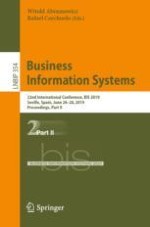2019 | OriginalPaper | Buchkapitel
Keyword-Driven Depressive Tendency Model for Social Media Posts
verfasst von : Hsiao-Wei Hu, Kai-Shyang Hsu, Connie Lee, Hung-Lin Hu, Cheng-Yen Hsu, Wen-Han Yang, Ling-yun Wang, Ting-An Chen
Erschienen in: Business Information Systems
Aktivieren Sie unsere intelligente Suche, um passende Fachinhalte oder Patente zu finden.
Wählen Sie Textabschnitte aus um mit Künstlicher Intelligenz passenden Patente zu finden. powered by
Markieren Sie Textabschnitte, um KI-gestützt weitere passende Inhalte zu finden. powered by
